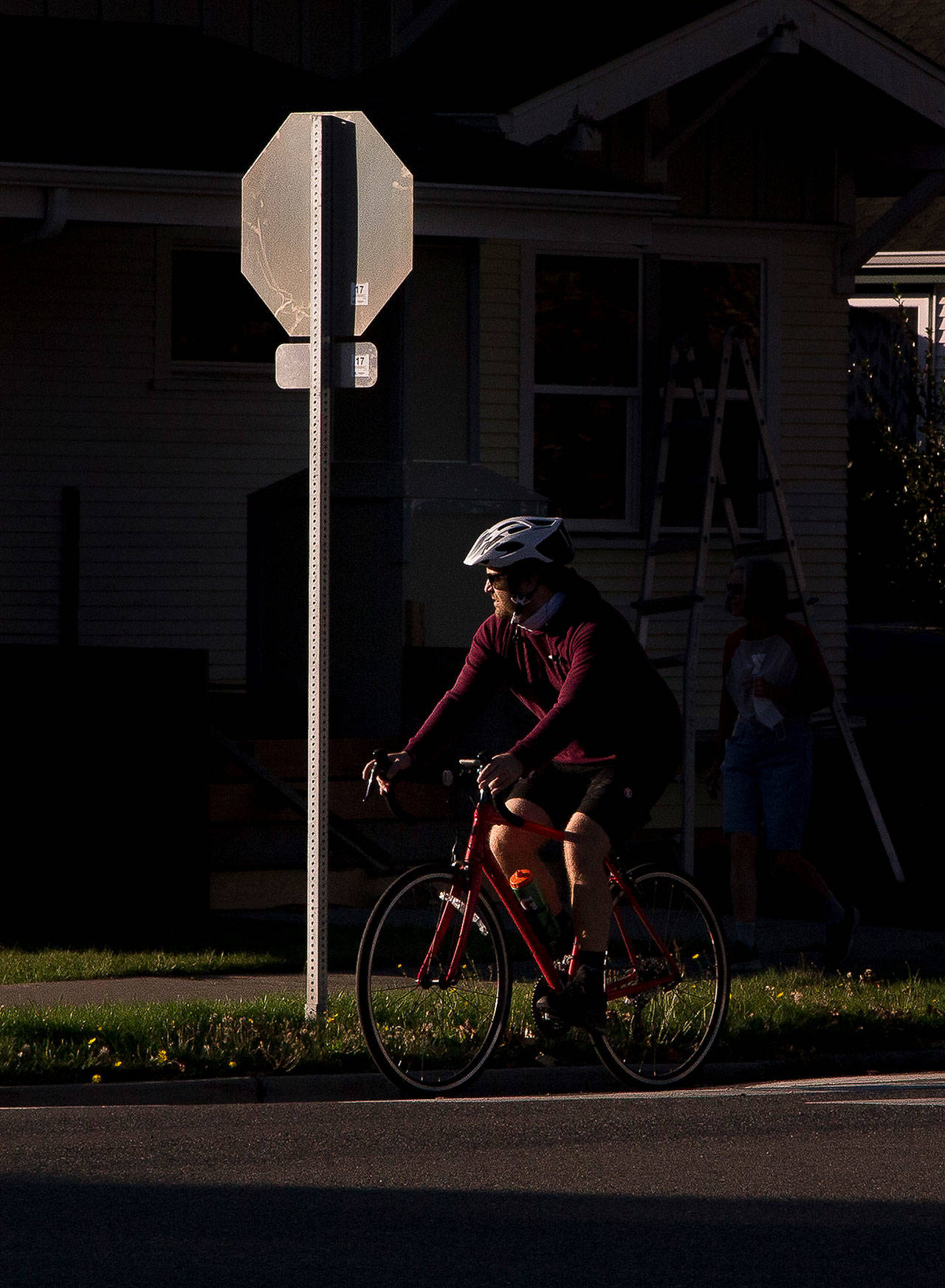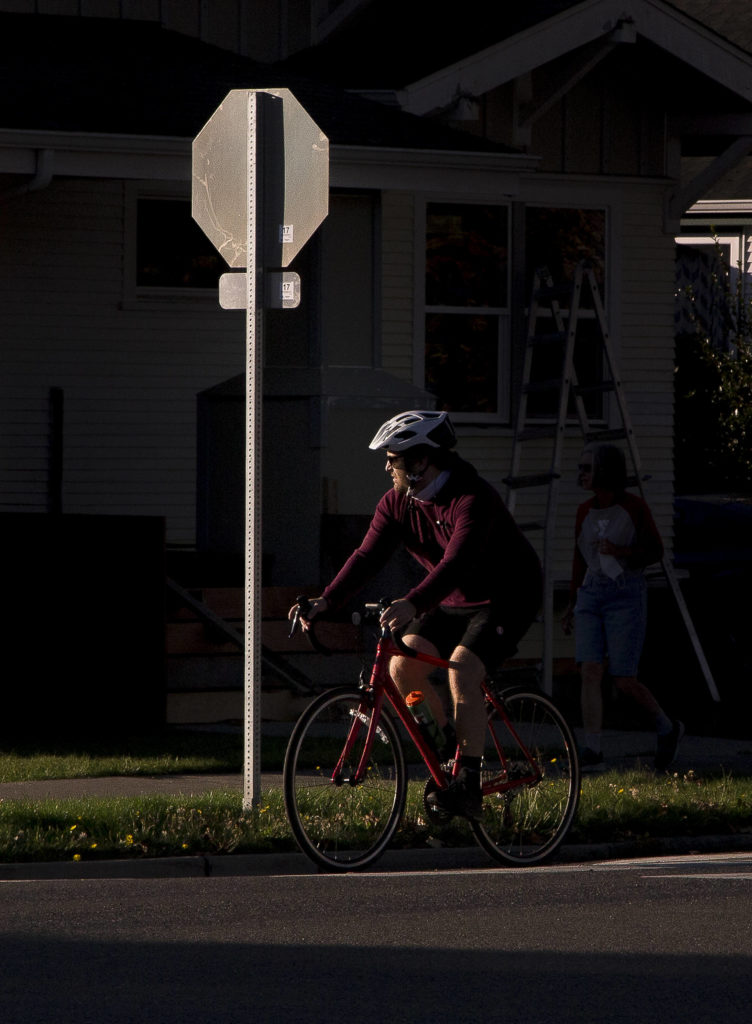California stop, meet your Birkenstock-wearin’, granola-lovin’ cousins, Idaho stop and Delaware yield.
Technically called the “safety stop,” Washington’s law is similar to that oft-derided and definitely illegal rolling creep, except it applies to bicycles instead of cars and now is legal in Washington.
Basically it’s a rolling slowdown that lets someone on a bike scan the intersection and if it’s clear, they can keep moving. If not, they need to stop. It’s still illegal for people driving vehicles.
As of Oct. 1, bike riders can treat stop signs like yield signs.
“It’s a way of helping keep everybody moving,” said Kristin Kinnamon, Sharing Wheels Community Bike Shop board president and past president of the B.I.K.E.S. Club of Snohomish County.
The law legalized a practice already used by frequent cyclists and commuting bike riders.
“I think it’s great. It makes something legal that I’ve been doing for a long time anyway,” Everett Transportation Advisory Committee chairman Tyler Rourke said. “I’m happy to be a law-abiding citizen again.”
Before drivers road rage themselves into high blood pressure, let’s clear up what the law doesn’t permit.
It’s not what people in the Facebook comments of every story about bike riding we publish complain over. Reckless road use is dangerous, and it doesn’t matter who’s doing it or what they’re operating.
“Under no circumstances should a bike rider be blasting through a stop sign,” Kinnamon said.
There is, however, a difference in the damage that the mass and speed of someone on a Schwinn can do compared to the mass and speed of a coupe, sedan, station wagon, SUV or truck.
“If I roll through the stop, I’m not hurting anybody else,” said Barb Chamberlain, Active Transportation Division director at the Washington State Department of Transportation.
Centers for Disease Control and Prevention data ranks biking as the 15th highest form of non-fatal injuries for all ages between 2000 and 2018. In that time, there were 306,133 reported emergency department visits from hurt bike riders.
In 2018, 871 cyclists, including 37 children, were killed in collisions with drivers and another 846 died last year, according to National Highway Traffic Safety Administration data. In Washington state, 16 people on bikes died in 2018 and nine the following year.
State Sen. Marko Liias, D-Mukilteo, was one of the bill’s original sponsors. He credited Washington Bikes, a cycling advocacy group, for a lot of the policy work and lobbying the Legislature, where it passed the state House 77-20 and the state Senate 44-1 in March.
“Ultimately, as a transportation mode we’re really focused on trying to encourage biking,” Liias said.
The WSDOT 2017 Annual Volunteer Bicyclist & Pedestrian Count tallied 560,768 active transportation users. More people biking or walking to work means fewer vehicles on the road and less pollution.
Washington became the fifth state with such legislation along with Arkansas, Delaware, Idaho and Oregon.
Not to codify a law with another state’s name, Washington’s legislation calls what’s usually referred to as the “Delaware yield” or “Idaho stop” the “safety stop.”
State law requires bike riders, just like vehicle drivers, to yield to moving cross-traffic.
The revised law still has requirements for cyclists to come to a full stop at rail crossing and behind a school bus.
But Chamberlain said drivers have the greater responsibility on the road because they have greater impact force in a collision with someone biking, rolling, strolling or walking.
“(Drivers) need to keep doing what they should have been doing all along: looking out for people who are not in a vehicle,” she said.
Cyclists must slow down to a speed that would let them stop if necessary, but the law also lets them keep momentum if the intersection is clear. Moving bike riders are more nimble on the road because they don’t have to put their feet down or work to get up to speed again.
“I’ve realized that it is in fact safer,” Rourke said. “Accelerating and decelerating is a lot more work for a person on a bike.”
The law is specific to bike riders, so people roller skating, on scooters or skateboards must stop at stop signs. That could change in time for scooters that have brakes, Liias said.
Have a question? Email streetsmarts@heraldnet.com. Please include your first and last name and city of residence.
Talk to us
> Give us your news tips.
> Send us a letter to the editor.
> More Herald contact information.


























